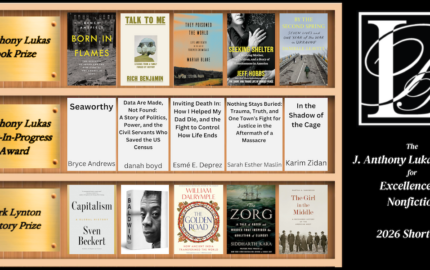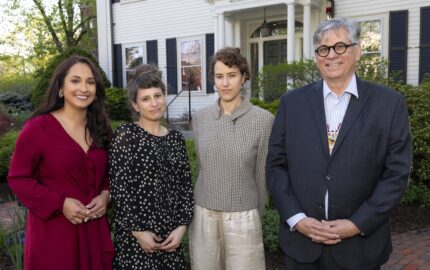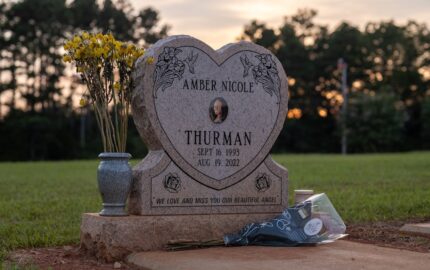CAMBRIDGE, Mass. – New York Times correspondent David Rohde will deliver the 29th annual Joe Alex Morris Jr. Memorial Lecture at the Nieman Foundation for Journalism at Harvard on Thursday, February 4, 2010. Each year, the Morris Lecture honors an American overseas correspondent or commentator on foreign affairs.
Rohde is a two-time Pulitzer Prize-winning investigative reporter who has covered the conflicts in Afghanistan, Pakistan, Iraq, Israel-Palestine and the Balkans. He also is the author of “Endgame: The Betrayal and Fall of Srebrenica, Europe’s Worst Massacre Since World War II.”
Rohde was kidnapped by the Taliban but escaped last June after more than seven months in captivity in the mountains of Afghanistan and Pakistan. He wrote a five-part series about his experience for The Times and now is on leave from his job, writing a book about events in Afghanistan and Pakistan since 2001. Rohde served as his newspaper’s South Asia bureau co-chief in New Delhi from 2002 to 2005. He joined The Times in 1996 and worked as a reporter on the metropolitan desk for five years.
Previously, Rohde was the Eastern Europe correspondent for The Christian Science Monitor from 1994 to 1996, a suburban correspondent for The Philadelphia Inquirer from 1992 to 1993 and a production associate at ABC News in 1992. Foreign Affairs, The Associated Press and The Washington Report on Middle East Affairs have also published his work.
In 2009, Rohde was part of an eight-reporter team from The New York Times that won the Pulitzer Prize for International Reporting for coverage of Afghanistan and Pakistan. In 2001, he received a Silurian Society award for an investigative series he co-wrote on the poor quality of New York City court-appointed lawyers.
In 1996, his stories for The Christian Science Monitor on the mass execution of 7,000 Bosnian Muslims following the fall of Srebrenica were awarded the Pulitzer Prize for International Reporting as well as George Polk, Livingston, Sigma Delta Chi, Overseas Press Club, and Investigative Reporters and Editors awards.
In spring 2005, Rohde was a fellow at the Shorenstein Center on the Press, Politics and Public Policy at Harvard Kennedy School. In 2000, the Open Society Institute awarded him a fellowship to write about ethnic and sectarian conflict in various countries.
The Joe Alex Morris Jr. Memorial Lecture honors the foreign correspondent of the Los Angeles Times who was killed in February 1979 while covering the Iranian Revolution in Tehran. In the fall of 1981, Morris posthumously received the Nieman Fellows’ Louis M. Lyons Award for Conscience and Integrity. The lectureship in his name was created in 1981 by his family, Harvard classmates and friends.
Morris was a member of the Harvard Class of 1949. He inherited an interest in international news from his father, who had served as foreign editor of United Press International and the New York Herald Tribune. After working as a local reporter at The Hartford Times and the Minneapolis Tribune, Joe Jr. worked at Newsweek and later the Los Angeles Times. The Middle East was his journalistic home for 25 years.
Established in 1938, the Nieman Foundation for Journalism at Harvard administers the oldest midcareer fellowship program for journalists in the world. The fellowships are awarded to working journalists of accomplishment and promise who travel to Harvard University for a year of study, seminars and special events. More than 1,300 journalists from 89 countries have received Nieman Fellowships. The Nieman Foundation also publishes the quarterly magazine Nieman Reports, the nation’s oldest magazine devoted to a critical examination of the practice of journalism, and is home to the Nieman Journalism Lab, which identifies emerging business models and best practices in journalism in the digital media age. Additionally, the foundation runs the Nieman Narrative Digest and Nieman Storyboard, two Web sites that showcase exceptional narrative journalism, and Nieman Watchdog, a Web-based project that encourages journalists to monitor and hold accountable all those who exert power in public life.
Rohde is a two-time Pulitzer Prize-winning investigative reporter who has covered the conflicts in Afghanistan, Pakistan, Iraq, Israel-Palestine and the Balkans. He also is the author of “Endgame: The Betrayal and Fall of Srebrenica, Europe’s Worst Massacre Since World War II.”
Rohde was kidnapped by the Taliban but escaped last June after more than seven months in captivity in the mountains of Afghanistan and Pakistan. He wrote a five-part series about his experience for The Times and now is on leave from his job, writing a book about events in Afghanistan and Pakistan since 2001. Rohde served as his newspaper’s South Asia bureau co-chief in New Delhi from 2002 to 2005. He joined The Times in 1996 and worked as a reporter on the metropolitan desk for five years.
Previously, Rohde was the Eastern Europe correspondent for The Christian Science Monitor from 1994 to 1996, a suburban correspondent for The Philadelphia Inquirer from 1992 to 1993 and a production associate at ABC News in 1992. Foreign Affairs, The Associated Press and The Washington Report on Middle East Affairs have also published his work.
In 2009, Rohde was part of an eight-reporter team from The New York Times that won the Pulitzer Prize for International Reporting for coverage of Afghanistan and Pakistan. In 2001, he received a Silurian Society award for an investigative series he co-wrote on the poor quality of New York City court-appointed lawyers.
In 1996, his stories for The Christian Science Monitor on the mass execution of 7,000 Bosnian Muslims following the fall of Srebrenica were awarded the Pulitzer Prize for International Reporting as well as George Polk, Livingston, Sigma Delta Chi, Overseas Press Club, and Investigative Reporters and Editors awards.
In spring 2005, Rohde was a fellow at the Shorenstein Center on the Press, Politics and Public Policy at Harvard Kennedy School. In 2000, the Open Society Institute awarded him a fellowship to write about ethnic and sectarian conflict in various countries.
The Joe Alex Morris Jr. Memorial Lecture honors the foreign correspondent of the Los Angeles Times who was killed in February 1979 while covering the Iranian Revolution in Tehran. In the fall of 1981, Morris posthumously received the Nieman Fellows’ Louis M. Lyons Award for Conscience and Integrity. The lectureship in his name was created in 1981 by his family, Harvard classmates and friends.
Morris was a member of the Harvard Class of 1949. He inherited an interest in international news from his father, who had served as foreign editor of United Press International and the New York Herald Tribune. After working as a local reporter at The Hartford Times and the Minneapolis Tribune, Joe Jr. worked at Newsweek and later the Los Angeles Times. The Middle East was his journalistic home for 25 years.
Established in 1938, the Nieman Foundation for Journalism at Harvard administers the oldest midcareer fellowship program for journalists in the world. The fellowships are awarded to working journalists of accomplishment and promise who travel to Harvard University for a year of study, seminars and special events. More than 1,300 journalists from 89 countries have received Nieman Fellowships. The Nieman Foundation also publishes the quarterly magazine Nieman Reports, the nation’s oldest magazine devoted to a critical examination of the practice of journalism, and is home to the Nieman Journalism Lab, which identifies emerging business models and best practices in journalism in the digital media age. Additionally, the foundation runs the Nieman Narrative Digest and Nieman Storyboard, two Web sites that showcase exceptional narrative journalism, and Nieman Watchdog, a Web-based project that encourages journalists to monitor and hold accountable all those who exert power in public life.


